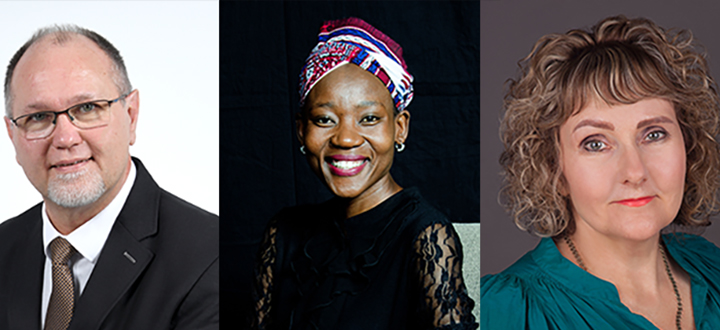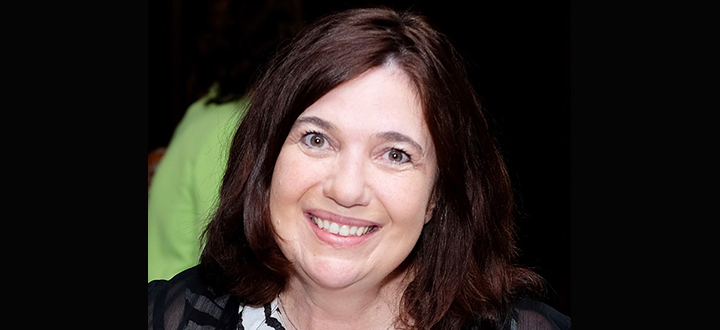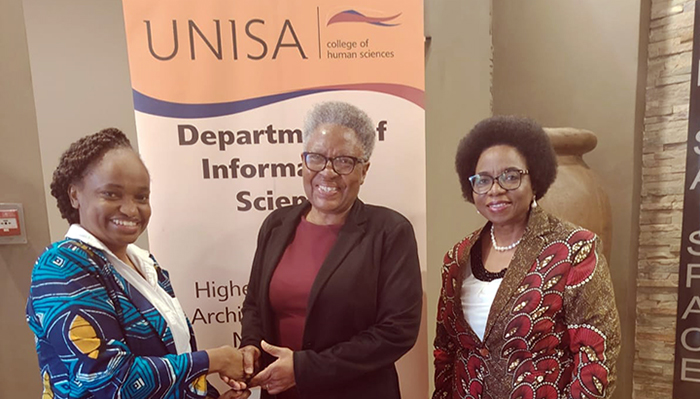College of Human Sciences
Unisa Radio a stepping stone to greatness
Tshego Magolego , a former Unisa Radio newsreader, has been nominated for the Mail & Guardian Top 200 Young South Africans in the category Film and Media.

Magolego proudly displaying his nomination certificate
This initiative recognises future leaders who have a positive effect on society. Magolego says being recognised by the judging panel is a humbling experience for him. "I grew up reading the Mail & Guardian and admiring the annual Top 200 finalists and winners," he says. "The likes of Zulaika Patel, Trevor Noah and Julius Malema are Top 200 alumni. To be nominated is therefore validating and reassuring for me."
When Magolego joined Unisa Radio in 2016, little did he know that it would have a considerable effect on his career. "When I joined Unisa Radio," he says, "I had no idea of what was expected of a newsreader. But the training and support I got from Unisa Radio’s management shaped me. I cut my journalism teeth under the leadership of the then Head of News, Martina Jege. Although I could not afford to buy lunch while I worked at Unisa Radio, I never complained. I had to take a train at 04:00 every morning to get to work and had only one pair of shoes. Today I am a Minority Africa fellow for 2023/2024 and have travelled to Israel recently to report on the Hamas-Israel war. Who could have predicted it back then?"

Magolego during his Unisa Radio days
Magolego is currently working at SABC News as an investigative journalist and producer of various shows, including the now discontinued Special Assignment, Expressions, Stories Untold and Democracy30, a show reviewing the past 30 years of democracy in South Africa and exposing injustices citizens still have to cope with.
Leaving Unisa Radio, he worked at ANN7 as an edit producer and got the opportunity to join Checkpoint on eNCA under the leadership of renowned journalist Nkepile Mabuse. Mabuse taught him to write to visuals, ask direct questions and do research. Following his successful time with Checkpoint, he embraced the opportunity to join Special Assignment at the SABC under Busi Ntuli.
At Special Assignment, Magolego was involved in various groundbreaking and hard-hitting projects for nearly a decade as an investigative journalist. The project that stands out for him was exposing the injustice minorities in the transgender community have to face. "I documented the lived realities of trans bodies who wanted to access basic healthcare at our public healthcare facilities," he explains. The National Department of Health told him that about four public hospitals offered gender reassignment surgery and medical reassignment services. His investigations revealed that it was a lie. At some of these hospitals, healthcare professionals did not even know what transgender means, let alone being able to direct him to a ward when he went undercover as a trans body. This story sent shockwaves across South Africa, showing how marginalised transgender individuals were.
Magolego is also the author of Sipho’s Pink Dress. He says the book was inspired by the high number of deaths by suicide around the country, specifically among members of the LGBTQ+ community. "I wanted this book to be not only a companion to gay kids, but also an educational tool to change the narrative, to teach, and to love," explains Magolego.

The cover of Magolego’s book, Sipho’s Pink Dress
Magolego says that South Africans motivate him. The memory of his late mother, Mashianoke’ a Lekgetle, gives him the strength to wake up with optimism each day.
Magolego’s focus for 2024 is to go global and be the voice for the voiceless. He wishes to tell African stories to the world. "For decades," he concludes, "the framing of our stories has been one-sided, as if we are weak and in need of help. I want to change this narrative at a global level by telling African stories in a more authentic manner that is whole and truthful. No longer will our perception of the African continent be that of a starving child. It must change to that of a confident and optimistic child."
* By Nnana Martina Jege, Communication and Marketing Specialist, College of Human Sciences
Publish date: 2024/04/04

 Unisa co-hosts G20 community outreach in the Eastern Cape
Unisa co-hosts G20 community outreach in the Eastern Cape
 Unisans gain membership of prestigious science academies
Unisans gain membership of prestigious science academies
 Advocating for disability transformation through servant leadership
Advocating for disability transformation through servant leadership
 Unisa Press continues to illuminate the publishing space
Unisa Press continues to illuminate the publishing space